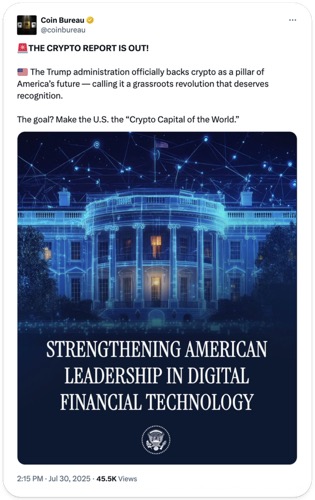Bankless: Will Trump Promote the "Nationalization" of Crypto Infrastructure?
Source: Bankless
Author: Jack Inabinet
Compiled and organized by: BitpushNews

"Trump's brand of American capitalism faces 'socialist' backlash from conservatives" — BBC
"Republican senators sound alarm over Donald Trump's 'socialist step'" — Newsweek
"Investors worry Trump's Intel deal ushers in an era of U.S. industrial policy" — Reuters
These recent headlines seem to capture the unease among business leaders, who are shocked to witness the U.S. federal government acquiring a 10% stake in Intel.
Although this move has split opinions within the party, drawing rare criticism from staunch conservatives while winning applause from the more socialist-leaning camp, one thing is clear: The script of American laissez-faire capitalism is being rewritten in real time.
During his second term, President Trump has clashed with free-market conservatives at least twice. In June this year, his administration approved the acquisition of U.S. Steel by Japan's Nippon Steel, but only on the condition that Washington receives a "golden share," granting broad governance rights over the American subsidiary.
Intra-party criticism may be a rare phenomenon in U.S. politics, but Trump has shown little concern for this round of conservative condemnation, declaring to his followers on Truth Social on Monday that he would make similar deals "all day long."
In a comment to The Hill, an anonymous Republican strategist defended Trump's takeover of companies like U.S. Steel and Intel, arguing that the move was justified because their output is "crucial to U.S. defense needs and national security."

When I think of cryptocurrency…
Although the U.S. government's current cryptocurrency holdings mainly come from criminal assets seized by law enforcement, if the Intel case is any indication, such acquisitions cannot yet be ruled out.
Since the beginning of his campaign, Donald Trump has promised to make clarity on cryptocurrency a policy priority. Early achievements of the Trump administration include:
-
Enacting the GENIUS Act to pave the way for the widespread adoption of mainstream stablecoins
-
Establishing a strategic cryptocurrency reserve to safeguard government-held digital assets
-
Revitalizing the SEC through dedicated cryptocurrency task forces and "crypto projects"
-
Dismissing major pending regulatory actions against cryptocurrency companies
Insiders in the Trump administration have long insisted on a "budget-neutral" approach to expanding federal crypto asset holdings, and the Intel acquisition seems to set a precedent for such purchases.
As the only cutting-edge chip manufacturer in the U.S., Intel plays a key role in securing America's digital future. Through this framework, the federal government may wish to protect the nation's best interests by holding Intel shares, such as guiding production priorities or prohibiting undesirable actions (like divesting loss-making chip foundries).
The acquisition of Intel was "funded" by allocations from the Biden-era CHIPS Act. While the funds allocated by this program undoubtedly cost taxpayers money, the money was originally intended for semiconductor R&D, meaning the government's Intel equity is technically "free."
The modernization of currency has long been imperative, just as computer chips have made critical contributions to contemporary society. Blockchain-based payments are sure to play an important role in the next generation of financial systems.

The passage of the GENIUS Act highlights that this fact has gained bipartisan recognition. Although any progress in Washington, D.C. is notoriously slow, future legislation could well authorize spending on grant programs aimed at strengthening blockchain payment systems.
Such a critical payment network would naturally be classified as vital to U.S. national security, and given the precedent set by the Intel deal, these grants could be seen as consideration for obtaining token rights in the network.
Therefore, the only real question now is which crypto asset Washington will choose to embrace. Will the U.S. consolidate its position as the world's largest national bitcoin holder, or will it choose another network as the pillar of its digital economy?
Regardless of the outcome, the precedent has been set: the U.S. government is no longer just a regulator of high technology—it is becoming an active market participant.
Disclaimer: The content of this article solely reflects the author's opinion and does not represent the platform in any capacity. This article is not intended to serve as a reference for making investment decisions.
You may also like
After Pectra comes Fusaka: Ethereum takes the most crucial step towards "infinite scalability"
The Fusaka hard fork is a major Ethereum upgrade planned for 2025, focusing on scalability, security, and execution efficiency. It introduces nine core EIPs, including PeerDAS, to improve data availability and network performance. Summary generated by Mars AI. The accuracy and completeness of this summary are still being iteratively updated by the Mars AI model.

Decoding VitaDAO: A Paradigm Revolution in Decentralized Science

Mars Morning News | ETH returns to $3,000, extreme fear sentiment has passed
The Federal Reserve's Beige Book shows little change in U.S. economic activity, with increasing divergence in the consumer market. JPMorgan predicts a Fed rate cut in December. Nasdaq has applied to increase the position limit for BlackRock's Bitcoin ETF options. ETH has returned to $3,000, signaling a recovery in market sentiment. Hyperliquid has sparked controversy due to a token symbol change. Binance faces a $1 billion terrorism-related lawsuit. Securitize has received EU approval to operate a tokenization trading system. The Tether CEO responded to S&P's credit rating downgrade. Large Bitcoin holders are increasing deposits to exchanges. Summary generated by Mars AI. The accuracy and completeness of this summary are still being iteratively improved by the Mars AI model.

